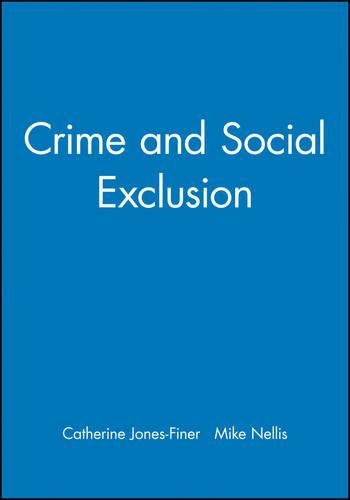Readings Newsletter
Become a Readings Member to make your shopping experience even easier.
Sign in or sign up for free!
You’re not far away from qualifying for FREE standard shipping within Australia
You’ve qualified for FREE standard shipping within Australia
The cart is loading…






Via a mutual concern with social exclusion, the agendas of criminology and social policy have begun to overlap far more in recent years. The two fields have always shared a common concern with class, and more recently with race and gender, but remained rigorously differentiated until crime prevention moved higher on political and academic agendas in the 1980s. This collection of papers explores aspects of social exclusion and the measures taken to reduce its impact from the perspective of both disciplines.The contributors write mainly, though not exclusively, from a British perspective. However the issues raised are of broader relevance to North America, Europe and elsewhere.Criminology in Britain has recently been examining the way in which political initiatives designed to contain and exclude dispossessed populations (seen to constitute major crime risks) have permeated all areas of criminal justice policy. In America this has led to an increased emphasis on the rhetoric of retribution, and the management of criminal classes, shifting away from earlier emphasis on rehabilitating individual offenders. Critics of this development increasingly recognize that more practical answers to crime involve not more penal repression but social policies designed to integrate and include the dispossessed, especially the young. It is in this connection that the experience of Singapore offers a different sort of warning.
$9.00 standard shipping within Australia
FREE standard shipping within Australia for orders over $100.00
Express & International shipping calculated at checkout
Via a mutual concern with social exclusion, the agendas of criminology and social policy have begun to overlap far more in recent years. The two fields have always shared a common concern with class, and more recently with race and gender, but remained rigorously differentiated until crime prevention moved higher on political and academic agendas in the 1980s. This collection of papers explores aspects of social exclusion and the measures taken to reduce its impact from the perspective of both disciplines.The contributors write mainly, though not exclusively, from a British perspective. However the issues raised are of broader relevance to North America, Europe and elsewhere.Criminology in Britain has recently been examining the way in which political initiatives designed to contain and exclude dispossessed populations (seen to constitute major crime risks) have permeated all areas of criminal justice policy. In America this has led to an increased emphasis on the rhetoric of retribution, and the management of criminal classes, shifting away from earlier emphasis on rehabilitating individual offenders. Critics of this development increasingly recognize that more practical answers to crime involve not more penal repression but social policies designed to integrate and include the dispossessed, especially the young. It is in this connection that the experience of Singapore offers a different sort of warning.